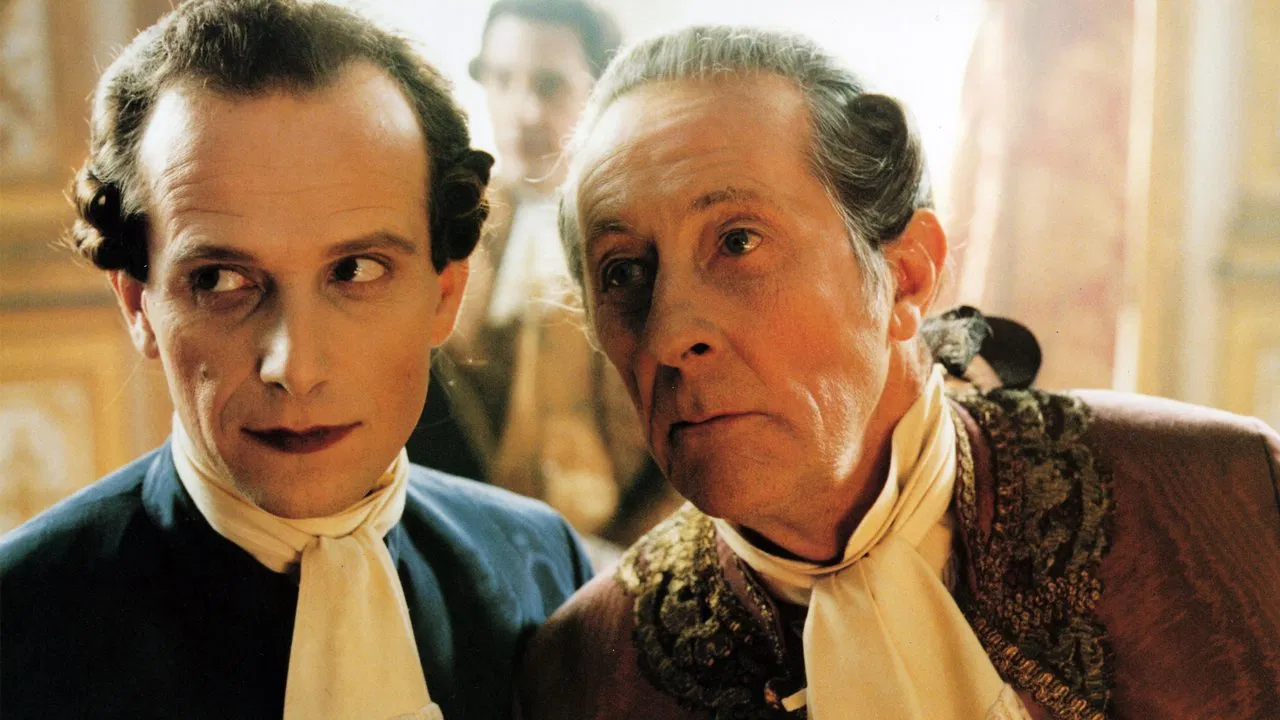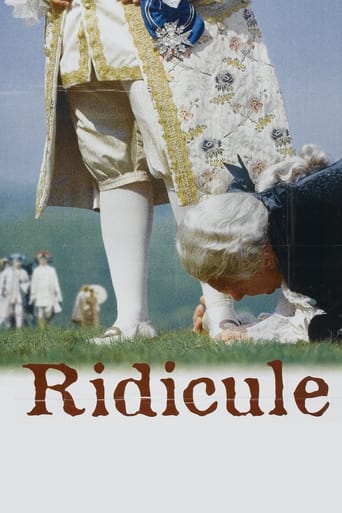

This is one of my favorite films. There are several story lines - the primary is about a young noble named Ponceludon wishing to drain his swamps in the Dombs, and seeking help from the Court of Louis the XV. What makes the film so memorable are the quips our hero makes. What a wonderful script! Although the film does not explain the differences between the peasants and the nobility which eventually led to the French Revolution, it does include scientific interests of the day and references to Pascal's writings, and the "discovery" of sign language for the deaf.See it for the sumptuous costuming, the script, the gorgeous art design and the beautiful leading ladies.
... View MoreRidicule was deadly in the time of Louis IV. This Oscar-nominated Best Foreign Film (losing to the excellent Kolja) explores the aristocracy before Louis lost his head.One could scarcely imagine those who were so idle that they prized wit above all else, and had rules for displaying it. Wit, to the French, was different than the English humor.A baron, Ponceludon de Malavoy (Charles Berling) is trying to get the Court to pay for draining the marshes on his property. The old Marquis de Bellegarde (Jean Rochefort), takes him as a protégée and teaches him that wordplay can be more powerful than swordplay in appealing to the aristocracy.Patrice Leconte (Monsieur Hire, The Hairdresser's Husband) has another winner here. The story of language and court intrigue is funny and fascinating.
... View MoreAdd my voice to those who like this fim and who find Fanny Ardent wonderful. But I think the transformation of Ponceledon du Malroy from someone I thought was at best awkward looking (or homely) to a refined and yes attractive man throroughly convincing. By the time he's finished I no longer considered him homely. The sub-titles of this movie are quite an achievement, managing at one point to rhyme, make the same point and deliver the punchline on the right beat - no small feat. It takes small hits over historical revisionism (uppity female nymphette-scientists?), and the re-use of a ruse mentioned in the early half of the film as the downfall of the protagonist.I don't understand a single reviewer who says the film is hysterical. I doubt you'll laugh out loud once. It's not that kind of movie. But it's pleasures are plentiful. And it's aimed squarely at adult viewers.
... View MoreRIDICULE deserved all the lavish praise it engendered upon its release in 1996. As a period piece (France in the final throes of King Louis XVI) it is one of the finest - visually, contextually, musically, AND it is wonderfully intelligent! Unlike many period pieces that serve as elegant decoration for meager stories, RIDICULE carries pungent statements about the decline of aristocracy and the whispers of the cause of democracy.A poor humanitarian travels from the ill swamps of Southern France to the court of Versailles to seek funding from the Royal Court to correct the deplorable living conditions ignored by the King. Upon arrival he finds a vapid society diverting attention from problems that plague the kingdom by inventing word games whose purpose is to find who can is best able to ridicule the fellow shallow players of this verbal chess game. Finding he has the gift to outclass the court with his verbal wit our humanitarian is 'accepted' into nobility and spars with the finest. For a while our humanitarian's focus is diffused by women, duels, and other diversions of the court until he finally regroups his cause and returns to the suffering sector from whence he came...with the ability to correct the conditions at last.The cast of Director Patrice Laconte's gem is exemplary and includes such fine actors as Charles Berling, Fanny Ardant, Jean Rochefort, Judith Godrèche, Bernard Giraudeau, and the mute role so sensitively performed by Bruno Zanardi (the one constant presence who keeps us reminded of just how absurdly low the court of France has fallen). The costumes by Christian Gasc (especially in the masked ball) are some of the more sumptuous ever created and the musical score by Antoine Duhamel and cinematography by Thierry Arbogast capture the atmosphere of both comedy and underling decay that makes this film so fine.Truly a film for those who enjoy double entendres and acerbic wit, this film grows better with repeated viewings. In French with English subtitles. Grady Harp
... View More